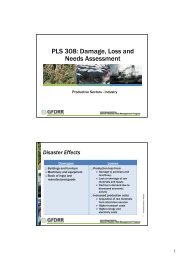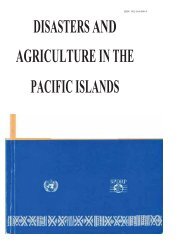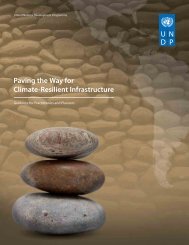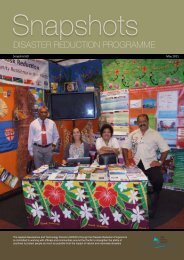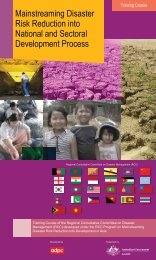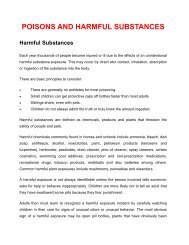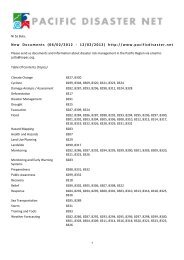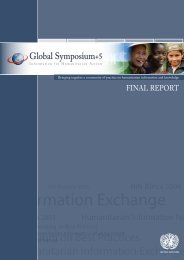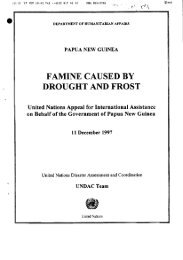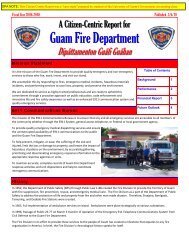Download - SOPAC
Download - SOPAC
Download - SOPAC
Create successful ePaper yourself
Turn your PDF publications into a flip-book with our unique Google optimized e-Paper software.
SnapshotsDISASTER REDUCTION PROGRAMMESnapshot 76April 2012The Applied Geoscience and Technology Division (<strong>SOPAC</strong>) through the Disaster Reduction Programmeis committed to working with officials and communities around the Pacific to strengthen the ability ofcountries to protect people as much as possible from the impact of natural and manmade disasters1
Federated States of Micronesia’s NationalEmergency Operations CentreConstruction of FSM’s National Emergency Operation Centre (NEOC) has commenced with the foundationexpected to be completed by end of May. The contractor, APSCO Construction, assured that while thefoundation will take some time the main structure that include walling and roofing should be in place by endof June.The new N EOC is being built in Palikir, National Capital, and will house the Office of Environment and EmergencyManagement. The building is expected to be completed by December 2012 and is estimated to cost aroundUS$260,000. Funding for the new building has been made available through the European Union Disaster RiskReduction project (B-Envelope) implemented by the <strong>SOPAC</strong> Division, Secretariat of the Pacific Community.The Project Manager, George Beck, recently visited the construction site and was happy with progress. TheGovernment is supervising construction work and we are working closely with all parties to ensure that there isminimum disruption to the work schedule. The project will also furnish the building with basic office furnitureand install early warning communication equipment. The project will be launching a tender in May 2012 forprocurement and installation of early warning communication equipment in all States in FSM.Construction side of the new NEOC.3
Introduction to Disaster Managementand Initial Damage Assessment TrainingCourse – Solomon Islands College ofHigher Education (SICHE)In early April, the Training and Capacity Building team supported the Solomon Islands National DisasterManagement Office (NDMO) to provide disaster risk management training to 71 students from the SolomonIslands College of Higher Education (SICHE) and personnel from other key agencies such as Red Cross, Savethe Children Fund, Oxfam, the Ministry of Health and the Ministry of Education. This training marked the sixthyear of a capacity building partnership between the NDMO, SICHE, the Ministry of Health and SPC/<strong>SOPAC</strong> tomainstream understanding of disaster risk management and decentralise post disaster initial damage andneeds assessment at provincial and community level.In previous years, the primary target group for this training was final year students in SICHE’s Diploma ofNursing programme, which incorporates disaster risk management training within its curriculum. This year,the participation was widened to include students enrolled in SICHE’s Bachelor Degree of Nursing Programme.In May and June this training will be conducted for nursing schools in the Malaita and Western Provinces.A team of national trainers with extensive disaster risk management experience facilitated the training, manyof who have been involved with the training at SICHE for the past three years. Through this training, theNDMO demonstrated its capacity to organise and produce the relevant training materials and conduct disasterrisk management training after acquiring the skills, techniques, and knowledge through their attendance atregional training and capacity building initiatives under the Pacific Disaster Risk Management Programme(PDRMP) implemented by the Disaster Reduction Programme (DRP).Loti Yates, Director of the Solomon Islands NDMO stated “as public officials, the participants from the trainingwill take the knowledge and skills they gained to their province of assignment where they will be able toprovide much needed guidance to community leaders to support informed decisions about development andassociated risks.” Mr Yates added “because of the wide distribution of islands that we have in the Solomons,a simple risk reduction activity such as raising awareness on disaster risk becomes an onerous task for ourstakeholders. More importantly, during disasters,the nursing students provide a vital link betweenthe National Emergency Operations Centre and thecommunities in facilitating fast and efficient responseinformation to cater appropriately for the needs ofdisaster affected communities. This is why we arefocusing more on this form of mainstreaming and itaugers well with the outcomes of the recent reviewin the disaster risk management arrangements of theSolomon Islands in which the health sector now playsa major role in the national health cluster in promotingpublic health awareness and ensuring quick medicaland public health support to the disaster affectedpopulation” said NDMO Director Yates.Brian Tom (Provincial Disaster Officer/ Isabel Province) facilitates a session at theSICHE IDM/ IDA Training.6
Nauru: Emergency Operations CentresTrainingBuilding on the Introduction to Disaster Management training conducted in November 2011, the NauruNational Disaster Risk Management Office (NDRMO) recently organised Emergency Operations Centrestraining targeting key stakeholder personnel from the Nauru Police Force, Fire and Rescue Service, Departmentof Health, the Utilities Corporation, Civil Aviation, Department of Marine and Fisheries, Department ofCommerce, Environment and Industry and the Phosphate Corporation (RonPhos). The Emergency OperationsCentres training, held from the 25 th of April to the 1 st of May was requested by the NDRMO and the NationalDisaster Risk Management Council as part of the process towards the development of Nauru’s National DRMAction Plan.During the opening for the training, Acting Chief Secretary Mr. Bernard Grundler, stressed the importance ofraising the level of disaster preparedness in Nauru and paying due attention to the underlying risk factors thatcontribute to the island’s vulnerability to hazards. He added that an increase in natural hazards equates toincreased risk of disasters for Pacific Island countries and Nauru is no exception.Mr Grundler was one of the twenty-one (21) officials who successfully completed the training, developing aclearer understanding of their roles in the establishment and management of Emergency Operations Centresin Nauru. In closing the five-day course, the National Disaster Controller and Commissioner of the Nauru PoliceForce, Mr Richard Britten, said that this training was an important element in the national DRM capacitybuilding process. He added that the National Disaster Risk Management Council of Nauru is confident that theparticipants will apply the skills and knowledge gained from the course in their workplaces and when requiredwill provide support to the NDRMO to manage the National EOC.The training was facilitated by regional trainers from the Pacific Disaster Risk Management Training Programmebased in Suva, Fiji assisted by Roy Harris, Nauru’s Deputy National Disaster Controller. Support for this trainingcourse was provided by the AusAID funded National Disaster Facility at SPC/<strong>SOPAC</strong> and The Asia Foundationwith support from the USAID Office of U.S. Foreign Disaster Assistance (OFDA).Participants practice the use of forms and information displays during an exerciseat the EOC training.Participants and facilitators of the Emergency Operations Centre training that wasconducted in Nauru from 25th April to 1st May, 2012.7
Upcoming Events• 14 – 19 May: Ba Topographic Survey, Fiji• 18 May: Initial Damage Assessment Training, Port Vila, Vanuatu• 21–25 May: Emergency Operations Centres Training, Port Vila Vanuatu• 22 May: PDN hands on training at IFRC’s Pacific Regional Disaster Management Meeting• 27 May – 14 June: Intervention to improving access to water for Pitcairn Islanders, Pitcairn IslandPostal Address: Private Mail Bag, GPO, Suva, Fiji IslandsStreet Address: Mead Road, Nabua, Fiji IslandsTel: +679 338 1377 Fax: +679 337 0040E-mail: s.zoll@sopac.orgWeb site: www.sopac.org



